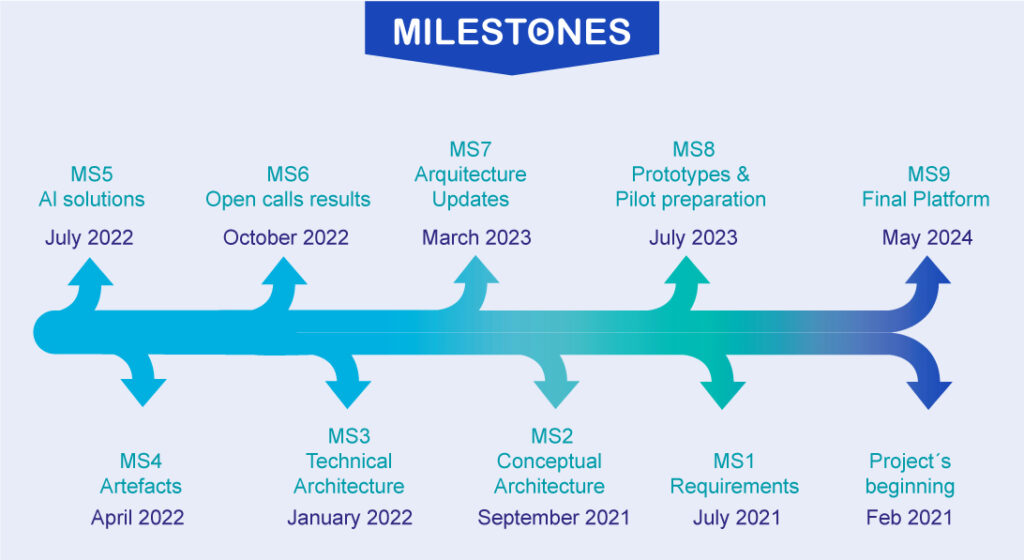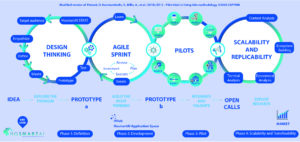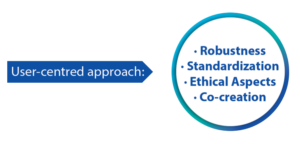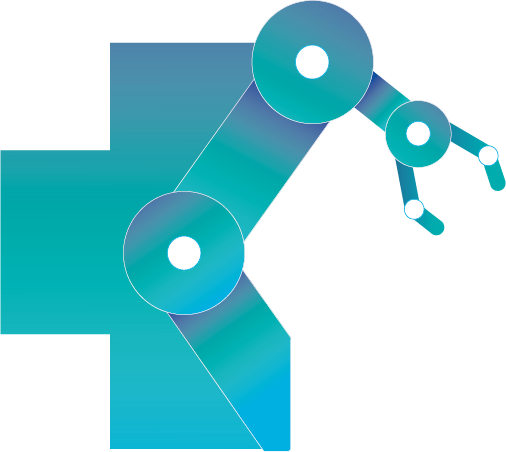
HosmartAI – “Hospital Smart development based on AI”, aims to promote an effective and efficient healthcare system transformation, by the use of AI technological developments and robotics. In order to achieve this transformation, HosmartAI will create a common open integration platform with the necessary tools to facilitate and measure the benefits of integrating digital technologies (robotics and AI) for healthcare professionals, patients, information system managers and health organisation administrations.
Vision
A strong, efficient, sustainable and resilient European healthcare system benefiting from the capacity to improve healthcare delivery and outcomes through the combined input of a consortium of European technology stakeholders including SMEs, industry, research centres, digital hubs and universities.

Mission
Guarantee the integration of digital and robot technologies in new healthcare environments and the possibility to analyse their benefits by providing an environment where digital healthcare tool providers will be able to design and develop AI solutions as well as a space to instantiate and deploy AI solutions.

OBJECTIVES
HosmartAI will pursue its mission realization through 9 objectives, divided into three (3) main categories.
Business objectives
that focus on the pre-commercial evaluation of the solutions and validation of the business assumptions, the scalability potential of the ecosystem, the spread of excellence gained and market entrance.
Technical objectives
that focus on the delivery and deployment in the real environment of the HosmartAI platform and added value services
Scientific objectives
that focus on the research to deliver a rigorous and self-standing methodology to drive the implementation and define its operational principles
HEALTHCARE CHALLENGES & AMBITIONS
Ambition in Diagnosis Revolution
More efficient and improved diagnosis and treatment of diseases are both possible and urgently needed.
HosmartAI aims to design and develop AI-assisted diagnostic tools that will decrease review time and interobserver variability and will increase diagnostic accuracy and intuition via applying and extending well-established AI paradigms. Additionally, HosmartAI aims to develop a digital health research platform inside the hospital that integrates clinical data and enables their analysis.


Ambition in Logistic efficiencies
Many healthcare organizations are facing roadblocks when it comes to supply chain efficiency. The existence of logistical services in a hospital must make it possible to relieve care professionals of logistical tasks so that they can focus on caring for the patient.
HosmartAI aims to provide an optimisation tool for radiotherapy treatment services, enhancing resources and infrastructure optimisation, and the wellbeing of patients. The implementation of machine learning, deep learning and optimisation algorithms will also provide test and validation environments and feedback and allow obtaining an operational and validated scheduling scalable system that could be easily implemented in radiotherapy treatment services and facilities. This system would allow maximising the (expected) number of patients completing pre-treatment within the waiting time target, increase compliance to access time standards without extending resource capacities, and improve patient satisfaction.
Ambition in Surgical Support
There is a continuous increase in the patient data available to set a diagnostic, decide on an optimal treatment, and support a clinician during the clinical procedure.
HosmartAI aims to develop a framework to process medical data coming from multiple sources and present the relevant data to help the surgical team decide on a patient specific treatment.


Ambition in Treatment Improvement
The majority of patient rehabilitation strategies for neurological diseases are based on one-to-one delivery, making clinical effects dependent on the presence of dedicated clinicians who are responsible for acceptance of the patient, protocols handling, tailoring of exercises, guiding patients during their execution and ensuring safety of procedures and organisation of settings, while guaranteeing access to therapy, adherence to prescriptions.
HosmartAI aims to augment information coming from the rehabilitation environment – integrating automatic behavioural detection, using place- and disease- related data – to better understand 1) which of the activities spontaneously performed by the patient might concur to the final clinical effect, 2) how the combination of these activities may be replicated and monitored remotely, 3) how the ideal treatment scenario can be technically replicated at home. In this regard, simulating home scenarios will allow the better support of the patient once discharged home with the aim: to improve treatment and therapeutic adherence, to improve remote monitoring, to increase the availability of treatment data and the amount of feedback provided to patients, to predict future hospitalization needs based on the received inputs.
Ambition in Assistive Care
The continuum of rehabilitation care is associated with encouraging care in domestic/ residential settings to enable elderly people to remain at home longer. Despite this aim, the use of Socially Assistive Robots (SAR) and virtual coaching systems is limited.
HosmartAI aims to integrate SAR into the care workflow in hospital wards and care and rehabilitation centres through Robotic Nurse (Pilot#5) and the Virtual Assistant (Pilot#6) with the aim to improve care outcomes through these pilot’s services combined with usual care for the rehabilitation pathway. Additionally, these services will enable personalized digital care both in hospitals and at home implementing. Furthermore, these services will allow adherence monitoring and help identify care gaps e.g. preventive care screenings to deliver value-based care.

METHODOLOGY
HosmartAI endorses the idea and principles of Responsible Research and Innovation (RRI) by:
- public engagement – through stakeholders’ involvement and a multidisciplinary approach
- gender – considering gender differences during all research activities
- transparency -through open access publishing and making datasets available and
- fairness – by conducting all activities according to legal and ethical national and European requirements and codes of practice.

Project’s four main phases:
- Phase 1: Defining the requirements and architecture that will create the basis of the work.
- Phase 2: Platform and 8 large-scale pilot’s development, based on agile software development.
- Phase 3: Validation of pilots by testing and analysing outcomes.
- Phase 4: Facilitating the further adoption of the project’s outcomes and exploitation of results.
HosmartAI will identify the appropriate key performance instruments (KPI) that measure efficiency without undermining access or quality of care. Liaison and cooperation activities with relevant stakeholders and open calls will enable industrial and other partner expansion of the AI and robotic health care ecosystem.
HosmartAI will work under the premise that co-construction with stakeholders and citizens is the only way to develop a viable healthcare system accepted by end-users.







